National Budget 2025-2026 and Civil Society Perspectives
0.67% Climate allocation of GDP is insufficient and unacceptable:
Initiatives to bring back laundered money are essential to meet budget deficit
1. Proposed National Budget 2025-26
Under the slogan of “Commitment to building a non-discriminatory and sustainable economic system,” on June 2, 2025, the interim government led by Professor Dr. Muhammad Yunus announced a budget of BDT. 790,000 crore for the Fiscal Year [FY] 2025-26, which is BDT. 7,000 crore less than the current FY. The revenue collection target has been set at BDT. 564,000 crore, which is BDT. 23,000 crore more than the current FY. Total size of the Annual Development Program (ADP) has been set at BDT. 230,000 crore, which is 35,000 crore less than the current FY. It has been proposed to reduce inflation to 6.5%, currently, inflation rate in the country is at 9 to 10%. Experts say that although there are some good initiatives in this year’s budget, but the budget structure is traditional and the accumulated problems remain. But the government had the opportunity to present a different budget.
2. Interest payments cost on domestic & foreign debt have increased
A total target of BDT. 187,000 crore has been set for interest payments on domestic and foreign loans for the next fiscal year. We can see that the interest payment expenditure in the current fiscal year is BDT. 113,500 crore, which will increase by another BDT. 20,000 crore in the next fiscal year to more than BDT. 133,000 crore, which is about 16.8% of the proposed budget. According to economists, a deficit budget is not uneconomic, yet limiting deficit financing is necessary to prevent inflation and balance actual costs. A large amount of money goes into the annual budget to pay interest and principal on debts, as a result, a large part of the budget allocation does not directly benefit the public.
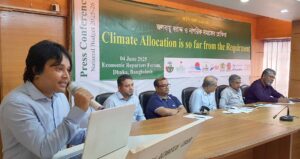
3. Tax pressure is increasing along with price inflation in a recessionary market
Like every other time, this year’s budget did not reflect the expectations of people, rather, the expectations of some colonial institutions have been fulfilled. Although budget size is BDT.7, 000 crore less than last year, the NBR has been given a target of BDT. 4.99 lakh crore, which is about BDT. 19,000 crore more than last year, which is 88.47% of total revenue target. To achieve this target, as always, the National Board of Revenue has emphasized indirect taxes, and VAT rates have been doubled in almost all areas, and in most cases, those benefits have been removed on goods or services that were exempted or had a low rate of VAT. This has a direct impact on the general public, especially the middle class. According to economists, a 1% increase in indirect taxes increases poverty by 0.42%.
In this time of high inflation, annual tax-free income limit of individual taxpayers has not been increased, remaining unchanged at BDT.3.5 lakh. However, annual tax-free income limit for the 2026-27 and 2027-28 fiscal years has been proposed at BDT. 3 lakh 75 thousand. There is also a loophole, because in this case, government has proposed six tax rates instead of seven, and the next BDT. 3 lakh will have to be taxed at a rate of 10%, which was previously 5% on BDT. 1 lakh. Although the maximum tax rate has been kept
As 30%, many taxpayers will have to pay higher tax rates even if they earn the same as last year due to the reduction in the limits of the previous stages. According to the new rate, if a taxpayer has a monthly income of BDT. 1 lakh, he/she will have to pay about BDT. 12 thousand more tax than before. It has been proposed to increase the minimum tax from BDT.3000 to 5000, as a result, low-income people will be reluctant to pay taxes, and tax evasion will increase.
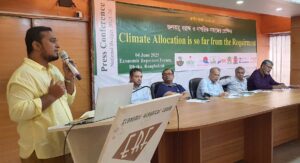
Although there are about 1.3 million e-TIN holders in the country, only 4.5 lakh returns have been submitted this year. 41% of the country’s total income is now in the hands of richest 10% of people. On the other hand, poorest 10% of people earn only 1.31% of the country’s total income.
4. This time too, there is an opportunity to turn black money into white.
It has been proposed to continue the opportunity to whiten black money this time too. Those whose main objective was state reform have now abandoned their strict stance against corruption and have completely ignored the main objective of reform and surrendered to the corrupt. There is no specific proposal in the budget regarding the thousands of crores of taka leaving the country every year through capital flight, over-invoicing, and under-invoicing. Even after 10 months, we have not seen any special progress in bringing back the billions of dollars that have been laundered in the past years; rather, new branches of corruption are now sprouting. The government is leaning on foreign loans as before and is imposing a tax burden on us.
5. Preventing and recovering money laundering is essential to meet budget deficits
We know that, in the 15 years from 2009 to 2023, $234 billion (BDT. 28 lakh crore) was laundered from the country abroad, which is an average of BDT.180 thousand crore per year. According to the recently published white paper, 3.4% of total GDP was laundered every year, and about 80% of this laundering took place under the guise of trade. This capital laundering was mainly due to lack of transparency, accountability, weak governance, lack of coordination of monitoring agencies, institutional corruption, and lack of political will. [Daily Ittefaq, 02 December 2024] We think that to implement agenda of World Bank and IMF, the rates of various types of taxes (direct and indirect taxes) and their coverage will be increased in this budget, especially the VAT rate is being increased in almost all cases and in some cases it is being doubled to 15%, and this will increase the living cost of the common people. However, these financial institutions never ask any government to bring back the laundered money.
6. Changed capital flight routes; investigative agencies’ coordination is essential to prevent
But the reality is that money laundering cannot be stopped. Once, popular destinations for money laundering from Bangladesh included Switzerland, the UK, the US, Malaysia, Canada, and some island countries known as tax havens. However, due to increased surveillance in these countries over the last few years, the destinations for money laundering are now shifting to countries in the Middle East, Southeast Asia, and Eastern Europe, including Dubai in the United Arab Emirates. According to the current gov’t white paper, Bangladeshis own 532 houses or assets in Dubai, valued at $375 million. As of March 2024, 3,600 Bangladeshis have been nominated for the Second Home Program in Malaysia. [Ittefaq, 02 December 2024]. Currently, seven agencies, including the ACC, are working to prevent and control money laundering. Out of 27 related offenses in the existing Prevention of Money Laundering Act, the ACC is only investigating the laundering of money obtained through crime related to ‘bribery and corruption,’ while the remaining 26 related offenses are under investigation by other agencies, including CID and NBR. Therefore, if there is coordination among them and they work together, it is expected that this money laundering will be significantly reduced.
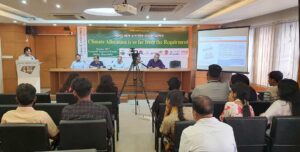
7. The Relevance of sustainable economic development and climate finance
Bangladesh has already achieved the economic and environmental criteria set by ECOSOC and has moved from a low-income country to a middle-income country. But the question is how much of the achievement of the environmental criteria set by ECOSOC has been based on reality and how much on statistical data. The four criteria in ECOSOC’s Environmental Risk Index are the number of people living in high-risk coastal areas, the number of people living in drought-prone areas, the level of instability in agricultural production systems, and the number of people who are or are likely to be victims of disasters.
About 25 million people in Bangladesh reside in the most vulnerable coastal areas. Although it is said that sufficient dams are in place to protect coastal livelihoods, in reality, about 70-80% of these dams are ineffective in managing disasters. A report by the International Food Policy Research Institute (IFPRI) states that approximately 1.5 million hectares of coastal land are facing a salinity crisis, and if effective measures are not implemented, agricultural income is expected to decline by 21% annually. The IPCC estimates that Bangladesh may lose 30% of its food production by 2050. Currently, the drinking water crisis has become severe in more than a hundred upazilas across 18 of the 19 coastal districts. The IDMC report 2025 states that the number of internally displaced people in Bangladesh due to disasters such as floods and cyclones has increased by approximately 600,000 in one year, bringing the total number of displaced people in the country to around 2.4 million. A United Nations study cites that floods and cyclones cause losses of $3.2 billion or BDT. 25,600 crore in Bangladesh every year, which accounts for 2.2% of the gross domestic product (GDP). Such losses do not reflect sustainable development. Although these statistics meet UN standards, the reality of achieving sustainable development while leaving billions of people vulnerable and at risk merits significant consideration.
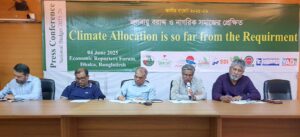
8. Scenario of the government’s climate finance commitments and budget allocations
Budget allocation for the climate sector is not planned and adequate at all. Although CSOs has demanded adequate climate funding to combat climate change, allocation has not increased but has decreased. In the 2024-25 budget, the climate allocation for 25 climate-related ministries was BDT. 42,206.89 crore, which is 10.09% of the total allocation and 0.75% of the total GDP, and in this proposed 2025-26 budget, the allocation has been BDT. 41,202,897 crore, which is 10.07% of the total allocation and 0.67% of the GDP.
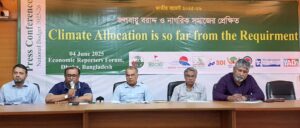
However, implementation of only 4 long-term plans to address climate change (BCCSAP 2009, Delta Plan-2100, National Adaptation Plan [NAP]-2023-2050, Nationally Determined Contribution [NDC] 2021-2030) requires $18.24 billion annually. Considering that Bangladesh needs $534 billion, or $19.7 billion annually, to tackle climate change by 2050, the question is: how much priority has been given to climate allocation in this year’s budget?
| Figure of climate allocation in last 5 years national budget |
| Fiscal year |
GDP at current Prices [BDT. crore] |
Total National Budget [BDT. Crore] |
Total climate budget [BDT. Crore] |
Climate allocation as % of GDP |
| 2021-22 |
39,71,716 |
603,681 |
28,010 |
0.71% |
| 2022-23 |
44,90,842 |
678,064 |
32,409 |
0.72% |
| 2023-24 |
50,48,027 |
761,785 |
37,052 |
0.73% |
| 2024-25 |
55,97,414 |
797,000 |
42,207 |
0.75% |
| 2025-26 |
62,44,578 |
790,000 |
41,209 |
0.67% |
| Source: Climate Finance Budget Report on National Budget and Sustainable Development from FY 2021-22 to 25-26 |
9. Our demand for increased climate allocation; tax justice and stop illicit flow:
A. Considering the relevance of sustainable economic development and continuing climate risks, initiatives should be taken to implement the adopted plans based on own resources, and the minimum allocation of 3 percent of GDP for climate finance in the national budget should be reconsidered.
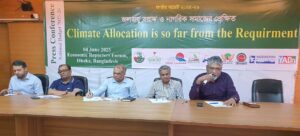
B. Construction of sustainable stone embankment; Ensure separate allocation [BDT. 10,000-12,000 crore] outside the traditional allocation. [In total, about 6,500 km of sustainable embankments are needed on the coastal areas at this time. And experts estimate that about BDT. 1, 30,000 crore is required to build all the dam sustainably in the next 10 years. In view of which, BDT. 10-12 thousand crore should be allocated separately every year outside the traditional allocation.
C. Priority-based allocation is needed to build required infrastructure development to expand fresh water and sanitation facilities in the coastal areas. Various studies say that 1.5 crore people in the coastal areas are forced to drink saline water and are suffering from various diseases and health risks. So need climate climate-resilient water treatment plant and other technologies]
D. Instead of imposing indirect taxes on the common people, focus on collecting wealth taxes. The country is losing about BDT.6, 000 crore from wealth tax every year. This will make it possible to allocate budget according to requirements to pro-poor friendly sectors like- education, health, agriculture, sanitation, etc.
E. Governments should take the initiative to enter into bilateral legal assistance agreements with countries where money is laundered, not only to reduce money laundering but also to make repatriation of laundered capital much easier.If at least 10% of the laundered money (280,000 crore taka) can be collected, it is possible to address this budget deficit without increasing indirect taxes, especially VAT rates.
Please download full report click here

EquityBD/COAST Foundation
Address: Metro Melody, House-13,
Road No. 02, Shyamoli, Dhaka-1207.
 Call for action on the eve of the International Conference on Financing for Development (FfD4) in Spain
Call for action on the eve of the International Conference on Financing for Development (FfD4) in Spain














































































































































